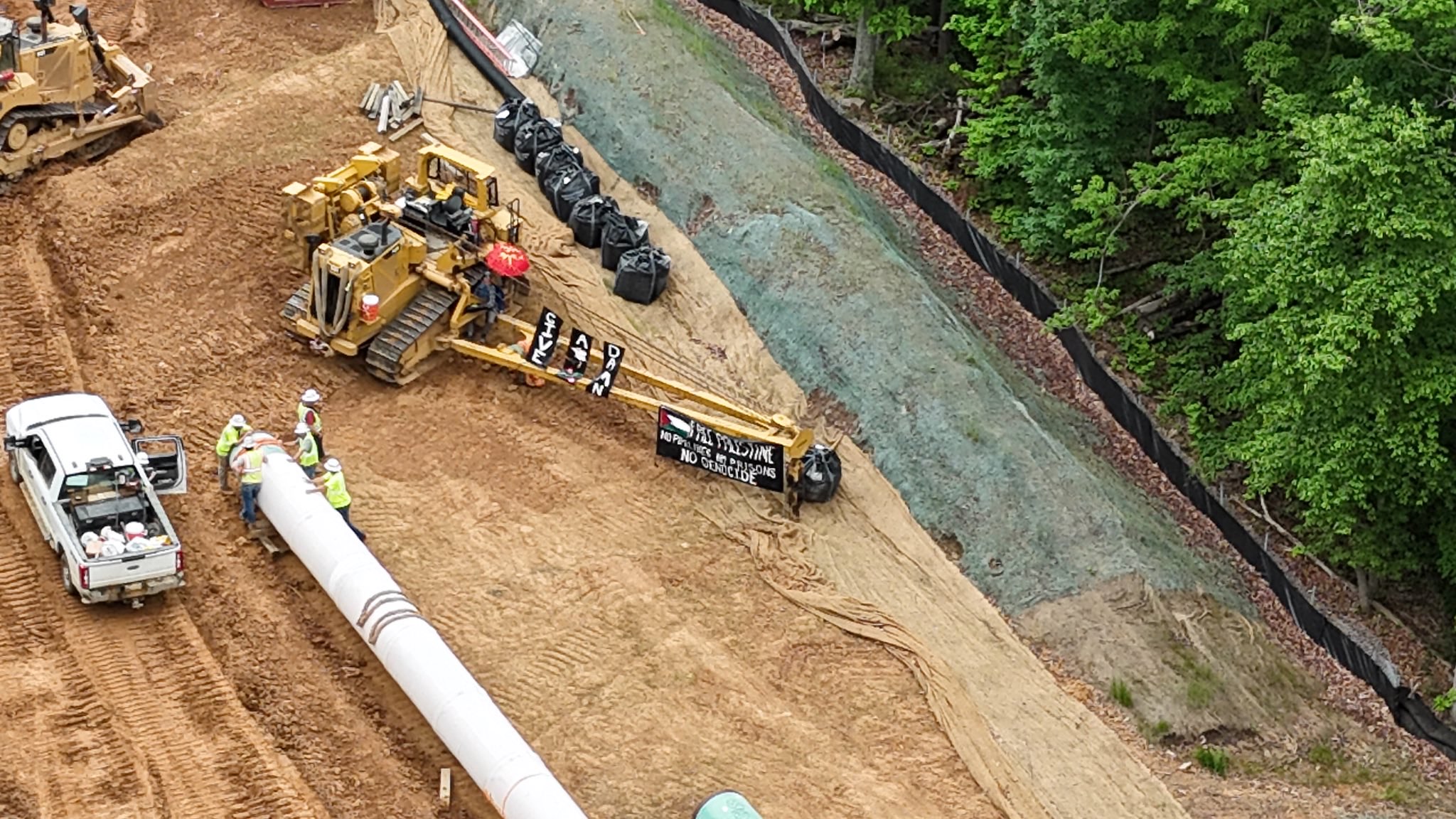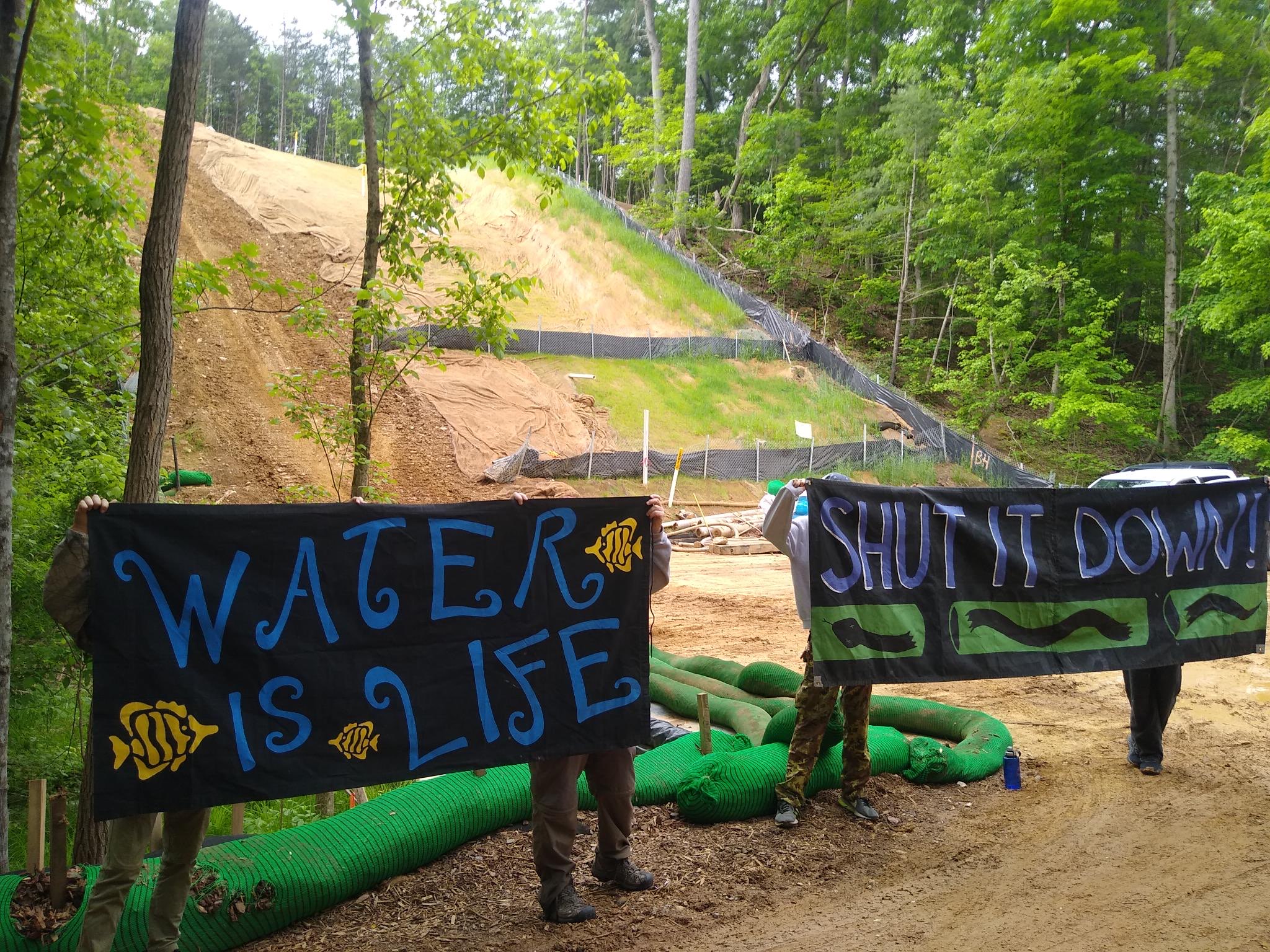Filed under: Action, Development, Environment, Land, Southeast

Action report on lock-down against the Mountain Valley Pipeline at a worksite on Poor Mountain in so-called Virginia.
Early Wednesday morning, pipeline fighter Finn locked himself to a side boom on a Mountain Valley Pipeline worksite on Poor Mountain in Montgomery County, VA, preventing MVP construction at the site for 11 hours.
“Why risk arrest? Why risk my name? Why devote my time and energy, to be here protesting this pipeline in the backwoods of Appalachia?” Finn asked. “The truth is I’ve lost the ability to look away. And it no longer makes sense to be anywhere else.”
At the base of the mountain, nearby where the pipeline easement crosses Yellow Finch Rd, a rally of people gathered to show their support for Finn’s action. They held signs with messages including, “WATER IS LIFE” and “SHUT IT DOWN.” The rally was held near the site of the former Yellow Finch treesits, which blocked construction of the MVP for 931 days.

One of the banners at the site of Finn’s action read, “Free Palestine No Pipelines No Prisons No Genocide.” In his statement describing his reasons for taking action against the MVP, Finn stated, “This place belongs to these creatures just as much as us humans, but we also belong to this place. And this place – our home – is being forever altered by this pipeline. I’ve been thinking a lot about home. About the 1.7 million Gazans displaced from their homes, as 34,000 have been killed. About the thousands of Native Tribes stripped of their ancestral homelands. About the towns and cities hollowed out of long-time residents to serve as tourist destinations, wealthy enclaves, places for investors to park their money. This same logic is present in this pipeline.”
MVP has filed for approval from the Federal Energy Regulatory Commission (FERC) to begin operations in late May. The company still has construction left to complete on steep and challenging sections including Poor Mountain, and on May 1, the pipeline ruptured during a pressure test on Bent Mountain in Roanoke County, VA. The Mountain Valley Pipeline is over budget by more than $4 billion and nearly 6 years behind schedule. The pipeline, if completed, would transport fracked gas across at least 303 miles of Appalachia. The project has a long record of environmental violations, and MVP’s permits have been revoked numerous times. In June 2023, the pipeline was fast-tracked by Congress, despite local residents voicing their opposition and concerns. Over the last few months, Mountain Valley Pipeline has escalated its legal intimidation of pipeline fighters, filing multiple Strategic Lawsuits Against Public Participation (SLAPP suits) and collaborating with local law enforcement to charge protesters with erroneous felonies in order to discourage resistance. The legal intimidation has failed to stop protestors.
Finn’s full statement is here:
Why risk arrest? Why risk my name? Why devote my time and energy, to be here protesting this pipeline in the backwoods of Appalachia? The truth is I’ve lost the ability to look away. And it no longer makes sense to be anywhere else.
Because I’ve walked these hills and know they belong to the deer, the foxes, the bears, the voles. Because I’ve breathed this mountain air and know it belongs to the songbirds and raptors. Because I’ve navigated these waters and know they belong to the beavers and fish. This place belongs to these creatures just as much as us humans, but we also belong to this place. And this place – our home – is being forever altered by this pipeline.
I’ve been thinking a lot about home. About the 1.7 million Gazans displaced from their homes, as 34,000 have been killed. About the thousands of Native Tribes stripped of their ancestral homelands. About the towns and cities hollowed out of long-time residents to serve as tourist destinations, wealthy enclaves, places for investors to park their money. This same logic is present in this pipeline.
The Mountain Valley Pipeline is razing these mountains and destroying this ecosystem, transforming life for all those who live here for the sake of the absolute comfort and convenience for an increasingly small subset of the current generations. I’m here because I stand opposed to the view that our ability to do this gives us a right to do this.
I’m here because – as they watch disasters grow larger and the bleaching of coral reefs, as they watch rivers run dry and species go extinct – younger generations are looking at the world and questioning if anyone cares about their home. About their future. I’ve seen this question in my niece’s face. I’m here so that I can tell her I do.





